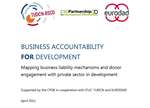Published on Wed, 2015-06-10 21:25
At the panel to commemorate the 20th anniversary of the World summit for Social Development, Social Watch coordinator Roberto Bissio said that “as we advance into the post-2015 agenda, some key ideas endorsed by the Social Summit are being reaffirmed. Inequalities are back in the agenda, after having disappeared for 15 years, and universality is recovered, with a strong sense of social protection floor. It is urgent, though, to make serious progress in the implementation of those agreed aspirations. Inequalities are in the title of a goal but nowhere to be found on the proposed indicators and a clear financing commitment on social protection floors (cash transfers/benefits for children, for people of working age in cases of maternity, unemployment, disability or work injury, and pensions for older persons, and other schemes) is still missing, even when now as in 1995, the resources are there." |
Published on Wed, 2015-06-10 19:30
How can we ensure that business – in particular multinational enterprises (MNEs) – really contribute to development in the countries where they operate? How can responsibility of their actions be granted against development impacts? How to keep them accountable for spending public money? These seem quite immediate questions. However, they still need to be answered. |
Published on Wed, 2015-06-10 18:16
Negotiations towards the Third International Conference on Financing for Development, to be held in Addis Ababa (Ethiopia) on July 13-16, are in full gear. In line with ongoing trends in the landscape of development assistance, deliberations thus far have shown a strong promotion, especially by Northern countries, of increased reliance on private sector sources for development funding. Two new studies set out to interrogate what does this mean for the language on human rights accountability of the private sector that we should expect to see negotiated in the conference, and whether expectations are being met by reality. |
Published on Mon, 2015-06-08 10:13
The UN Commission of Inquiry on Human Rights in Eritrea has released a damning report about the situation in the country in the Horn of Africa. “It is not law that rules in Eritrea – but fear,” states the report. Some of the violations described in the report may constitute crimes against humanity. |
Published on Tue, 2015-06-02 19:58
The post 2015 process will result in the adoption –by Heads of States at the United Nations on September- of a set of universal and transformative Sustainable Development Goals (SDGs) and targets. The success of this agenda is also connected to the outcome of the discussion on indicators, which is taking place within the Inter-Agency Expert Group and the UN Statistical Commission. One of the innovations brought by the SDGs is the inclusion of a Goal on peace, justice and inclusive institutions (Goal 16). As for all the others goals and targets, the selection of the indicators will be critical to ensure effective accountability and implementation. |
SUSCRIBE TO OUR NEWSLETTER







